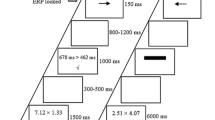Abstract
Two studies were conducted in order to test the hypothesis that the aftereffects of stress on both performance and social behavior are attributable to a depletion of attentional capacity. This depletion, or “cognitive fatigue,” was predicted to increase with both the attentional load and duration of an activity. A laboratory study demonstrated that aftereffects can be induced (without a stressor such as noise, crowding, or shock) by the performance of an attention-demanding task. Deficits on an aftereffects task increased as principal task demand and task duration increased. A second study, conducted in a field setting, found that after performing a high-load task, subjects were less likely to help a woman search for a contact lens than were their counterparts who performed a low-load task. Similarly, subjects who had been crowded were less likely to help than were those who had not been crowded. The data are interpreted as providing support for the “cognitive-fatigue” explanation of the aftereffects of stress.
Similar content being viewed by others
References
Cohen, S. Environmental load and the allocation of attention. In A. Baum, J. E. Singer, & S. Valins (Eds.),Advances in environmental psychology. Hillsdale, N.J.: Lawrence Eribaum Associates, 1978.
Cohen, S., Rothbart, M., & Phillips, S. Locus of control and the generality of learned help-lessness in humans.Journal of Personality and Social Psychology, 1976,34, 1049–1056.
Donnerstein, E., & Wilson, D. W. Effects of noise and perceived control on ongoing and subsequent aggressive behavior.Journal of Personality and Social Psychology, 1976,34, 774–781.
Feather, N. T. The relationship of persistence at a task to expectation of success and achievement-related motives.Journal of Abnormal and Social Psychology, 1961,63, 552–561.
Glass, D., & Singer, J.Urban stress. New York: Academic Press, 1972.
Isen, A. Success, failure, attention, and reaction to others: The warm glow of success.Journal of Personality and Social Psychology, 1970,15, 294–301.
Látane, B., & Darley, J. M.The unresponsive bystander: Why doesn't he help? New York: Appleton-Century-Crofts, 1970.
Lazarus, R. S.Psychological stress and the coping process. New York: McGraw-Hill, 1966.
Milgram, S. The experience of living in cities: A psychological analysis.Science, 1970,167, 1461–1468.
Popper, J. S. Defining and testing hypotheses in multi-dimensional contingency tables.Psychological Bulletin, 1973,79, 127–141.
Seligman, M. E.Helplessness. San Francisco: W. H. Freeman, 1975.
Sherrod, D. R. Crowding, perceived control, and behavioral aftereffects.Journal of Applied Social Psychology, 1974,4, 171–186.
Sherrod, D. R., & Downs, R. Environmental determinants of altruism: The effects of stimulus overload and perceived control on helping.Journal of Experimental Social Psychology, 1974,10, 468–479.
Sherrod, D. R., Hage, J. N., Halpern, P. L., & Moore, B. S. Effects of personal causation and perceived control on responses to an aversive environment: The more control, the better.Journal of Experimental Social Psychology, 1977,13, 14–27.
Wohlwill, J. R., Nasar, J. L., DeJoy, D. M., & Foruzani, H. H. Behavioral effects of a noisy environment: Task involvement versus passive exposure.Journal of Applied Psychology, 1976,61, 67–74.
Author information
Authors and Affiliations
Additional information
The research reported in this article was supported by a grant from the National Science Foundation (SOC 75-09224). Study II was part of the second author's Master's thesis.
The authors are indebted to Art Ellsworth, manager of Valley River Center; to Ann Lezak and George Hochstetler for serving as experimenters; to Caroline Gredvig and Valerie Kimble for serving as confederates; to Lita Furby for statistical counsel; to Mike Kemp, Al Murphy, and Nick Garshnek for technical assistance; and to David Krantz, Myron Rothbart, and David Mandel for comments on an earlier draft.
Rights and permissions
About this article
Cite this article
Cohen, S., Spacapan, S. The aftereffects of stress: An attentional interpretation. J Nonverbal Behav 3, 43–57 (1978). https://doi.org/10.1007/BF01114531
Issue Date:
DOI: https://doi.org/10.1007/BF01114531




